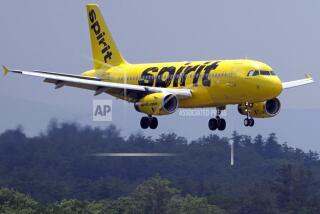Former Continental Employees Back in Sky : Pilot Group Launches Pride Air
- Share via
NEW ORLEANS — A group of former Continental Airlines pilots have launched a risky venture, a new airline offering low-cost service in the Sun Belt.
The new carrier, called Pride Air, is based here and its $15.5 million in start-up capital came largely from the pilots, more than 100 of whom have invested $90,000 apiece. In all, Pride has 522 investors, including 440 persons who used to work for Continental. About $4.2 million came from two venture capitalists.
Pride’s chairman Paul R. Eckel, formerly Continental’s chief pilot, acknowledged in an interview that the country is littered with the remains of airlines that have gone belly-up in the last few years. But he insisted that tiny Pride has devised a sophisticated plan for success--providing non-stop or one-stop service to a number of under-served markets in the west and Florida.
And he insists that the employee stock ownership plan that the company has set up will motivate Pride’s workers to do a good job, even though they will not be making high wages. “Every person here is motivated to make it happen,” Eckel said. “This is the current version of the Homestead Act. Pride Air intends to bring as many benefits to employees as possible.”
A number of Pride’s employees seem to have the attitude that Eckel wants.
“There’s a lot of room for advancement in this company,” said Susan Lamy, a flight attendant who is based in Los Angeles. “Everybody’s working with everybody,” she said on a flight from New Orleans to Los Angeles. “No one’s on a pedestal.”
The new company’s approach seems to have impressed travel agents as well.
“They’ve certainly got fire in the belly,” said Lee Kimball, vice president of sales at Van Nuys-based Ask Mr. Foster, one of the nation’s largest travel agencies.
Pride representatives visited more than 5,000 travel agency offices between July 8 and the company’s Aug. 1 start-up, attempting to interest the agencies who book 70% of the nation’s air travelers, according to a company official.
Pride, which has leased nine Boeing 727s, is now flying from eight cities--Miami, Fort Lauderdale, West Palm Beach, New Orleans, Los Angeles, San Diego, Las Vegas and San Jose. The second phase of its service is scheduled to begin this Wednesday with flights from Sarasota, Tampa, Jacksonville, Orlando, Salt Lake City, Denver, San Francisco and Sacramento.
Court Complaint
The relatively smooth take-off was jarred last week when Pride sued Raymond M. Gray, one of the two venture capitalists and a director of the company. A complaint filed in U.S. District Court in Los Angeles alleges that Gray violated an agreement that he and co-venture capitalist Brian Marlar made with Pride giving them a limited right to market travel vouchers for standby seats on Pride flights.
The suit asserts that Gray started to market the seats without Pride’s permission. Pride is seeking an injunction, $500,000 in compensatory damages and punitive damages of $20 million.
A Pride official said that at least one would-be passenger had bought a ticket sold by a company affiliated with Gray, only to find that the ticket was deemed invalid when trying to board a Pride flight in Los Angeles. The official said such incidents could seriously hurt the company unless they were nipped in the bud.
A lawyer for Gray did not return a call from the Times about the suit.
Airline analysts say that Pride has a chance to survive but that it won’t be easy.
Precarious Years
“The first four to five years are very precarious for an airline,” said Louis Marckesano, of Janney, Montgomery Scott, a Philadelphia-based securities firm. “I’m just accepting Southwest as a viable airline after 10 years. I’ve seen too many Midways and Air Floridas that look good and then fall off,” he added.
“It’s very tough to go out and compete in today’s environment, but it can be done,” said Lee Howard, executive vice president of Airline Economics, a Washington-based airline consulting firm. “What is needed is something unique, a niche in the market.”
Eckel, a devout Mormon, spent more than two years looking for just the right niche. He started in April, 1983, two years after he organized an unsuccessful employee buy-out of Continental in an attempt to prevent Texas Air Corp. from taking over the Houston-based carrier.
In September, 1983, his dreams of starting a worker-owned airline received an unexpected boost when Frank Lorenzo, Continental Airlines’ chairman, declared bankruptcy and cancelled his union contracts, resuming operations after cutting employee wages in half. The employees struck and Lorenzo earned the wrath of organized labor.
But Eckel said the bankruptcy represented “a great opportunity” for many of Continental’s employees--the chance to own their own airline.
“When Lorenzo declared bankruptcy it was as if the Lord had answered my prayers and gave me the opportunity to unite all these people again,” he said, referring to the employees who had wanted to buy Continental in 1981.
Raise $15 Million
Shortly after the bankruptcy, Eckel determined that he could raise more than $15 million from pilots who were entitled to substantial retirement benefits from Continental.
Once he realized start-up capital could be raised, Eckel started discussions with Lloyd Rixe, a Bozeman, Mont.-based airline consultant, about whether a new airline really was viable. They concluded that it would be possible, but that there were a number of pitfalls to be avoided.
Their first decision was that they could not compete as a short-haul carrier in high density markets, such as New York to Boston, because those markets already were saturated.
Rixe said he and Eckel concluded that the best opportunity lurked in the California-Florida corridor.
“It is a very fragmented market,” said Rixe, who is now the company’s vice president for strategic planning.
The two men eventually settled on New Orleans as a base of operations. With a population of 557,000, it is one of the largest cities on the routes they wanted to serve that did not already have an airline using its airport as a hub.
No Competitive Threat
“We made a studied attempt to not represent a competitive threat to anyone,” said Eckel.
Some Pride employees think it is ironic that their major competition at the start may come from Continental, or “The Other Airline,” as it is often referred to at Pride. In June, Continental said it would make New Orleans a mini-hub and in July it launched service from the Crescent City to Tampa and Orlando, two of Pride’s target cities. Continental also has announced plans to start non-stop service from New Orleans to Denver, Los Angeles and San Francisco--all of them Pride destinations.
“There’s definitely a need for non-stop major carrier service in those markets,” said Continental spokesman Mike Cinelli. He said Lorenzo would make no comments on Pride. Some Pride employees said they thought Continental’s moves were an attempt to undercut the new carrier, a charge that Cinelli denied.
In essence, Pride is starting as “a peripheral airline,” serving routes like Jacksonville-New Orleans where it now offers the only non-stop flight, or San Jose-Miami, where it offers the only service that does not require changing planes, said Rixe.
Pride executives, he said, decided early on that although Pride should be a low-cost carrier, it should not be a bargain-basement airline, such as People Express.
Long-Haul Carrier
“We’re a very long haul carrier, with many 1,000- and 2,000-mile links,” said Rixe. “That meant we needed a first-class section because the person who tends to travel first-class wants first-class more the longer the flight.”
Eckel said they also decided that Pride should offer a first-class section because the carrier’s primary target market is business travelers who may want to work on board.
Pride certainly is competitively priced. For example, to fly first-class one-way from Los Angeles to New Orleans non-stop on Delta costs $477 and the one-way coach fare is $367. To make the same trip on Pride’s first-class costs only $295, $209 in coach.
Thus far, Eckel said he is “very pleased” with Pride’s loads. One flight last week from Los Angeles to New Orleans was about 60% full, though a return flight was only about 35% full. Some analysts have said Pride will have to maintain a load factor of 57.5% to break even. Eckel said he could not comment on that estimate because the company is in registration with the Securities and Exchange Commission for a public stock offering and that divulging such details would violate SEC rules.
Eckel acknowledged that Pride’s success would in large part depend on the performance of its flight attendants, reservations staff and ticket agents, all of whom are paid considerably less than the pilots, but have much more contact with the public. Captains make $4,400 a month, first officers $3,600 and second officers $2,800. The attendants and reservation clerks make $1,100 a month.
Same as Continental
These pay scales are somewhat higher than other new carriers but about the same as Continental is currently paying.
“These people are betting on themselves--to do their jobs well and sell the airline,” Eckel said. To help motivate them, every employee will be given 100 shares of stock.
Randy Barber, an economic consultant to several unions, said Pride’s development will be watched closely by many in the labor movement.
“They’re worker-owned,” he said. “The question is how do they become worker-controlled.”
More to Read
Sign up for The Wild
We’ll help you find the best places to hike, bike and run, as well as the perfect silent spots for meditation and yoga.
You may occasionally receive promotional content from the Los Angeles Times.






